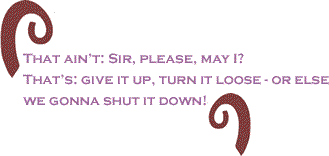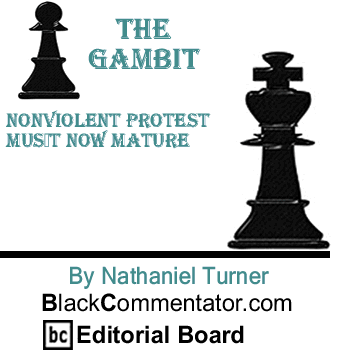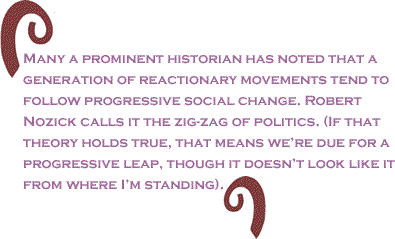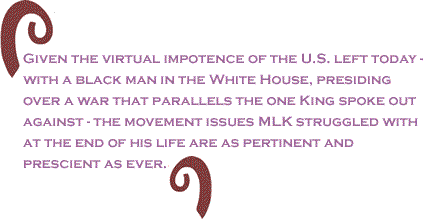
|
||||||||||||||||||||||
|
||||
 |
||||
It�s that time of year when America pays its obligatory lip-service to Dr. King�s �Dream,� pats itself on the back for overcoming state-sponsored terrorism in the South, all the while glossing over the most challenging and interesting features of King�s developing ideas and their implications for us now. There�s the 1955-1963 King - that part of his public life that�s been mythologized and memorialized like a museum piece ever since his assassination; the non-threatening, commercial, feel-good part of his legacy. Then there�s the 1965 to 1968 King - the King that a small but committed number of peace activists still takes seriously, even as the rest of mainstream and �progressive� America assiduously avoids it. As a child, it was the post �65 King that utterly enthralled me - not the �Dream� speech King. But, the dark, brooding, melancholy �Mountaintop� speech King. The one he gave the night before he was gunned down on the balcony of the Lorraine Motel. That speech (sermon, really) is what drew me into a deep, lifelong fascination with, and study of, the late Baptist preacher. It wasn�t until decades later that I began to appreciate the historical context of King�s latter years; and, more importantly, the fundamental questions of vision and strategy the end of his life poses for the future prospects of social change movements in America. Given the virtual impotence of the U.S. left today - with a black man in the White House, presiding over a war that parallels the one King spoke out against - the movement issues MLK struggled with at the end of his life are as pertinent and prescient as ever.
Studying the end days of the King era, one is led to the conclusion that the various social change movements of our time have not moved one step beyond where the black freedom movement stood in April 1968. Of course, it would be unfair to cast aspersions on the left for not having moved the movement forward. Many a prominent historian has noted that a generation of reactionary movements tend to follow progressive social change. Robert Nozick calls it the zig-zag of politics. (If that theory holds true, that means we�re due for a progressive leap, though it doesn�t look like it from where I�m standing). We can�t know the future but we can examine the social change experiments of history to see our way forward. King�s waning years are a good starting point. Recall that King had become involved in the Memphis sanitation workers strike, even as his organization (Southern Christian Leadership Conference) was in the midst of a grueling, nationwide fund-raising and recruiting effort to launch a �Poor People�s Campaign� later that spring.
That�s not the Kumbaya feel-good stuff you hear during those milquetoast King celebrations we�ve all had to endure. And here�s another thing you won�t see in a McDonalds or Coca-Cola commercial: �Something is wrong with capitalism as it now stands in the United States. We are not interested in being integrated into this value structure. Power must be relocated, a radical redistribution of power must take place. We must do something to these men to change them,� he told the SCLC advisory committee in New York later that month. He who hath ears let him hear! And if you don�t wanna hear it, you can read all about �The Poor People�s Campaign� in David J. Garrow�s Pulitzer Prize-winning account, Bearing the Cross.
Now, as Garrow notes, it�s not that King dismissed violent revolution because he thought it was morally repugnant. King, rightly I think, judged that an armed revolt had about as much chance as a one-legged man has of winning an ass-kicking contest. And, believe me, I speak with some authority on that score. What�s my name? Nat Turner.
Still, King wasn�t na�ve about nonviolent direct action. It �must be adapted to urban conditions and urban moods,� he said. �Nonviolent protest must now mature to a new level�mass civil disobedience.� The movement needs a �force that interrupts (society�s) functioning at some key point.� That ain�t: Sir, please, may I? That�s: give it up, turn it loose - or else we gonna shut it down! Now you see what I mean when I say that the various social change movements of our time have not moved beyond where the black freedom movement stood in April 1968. Think about it. We can�t even muster the numbers to shut down D.C., let alone lay nonviolent siege to several major cities at once, as King envisioned. Less than six months after King told his confidants of the need for massive civil disobedience (as opposed to the low-level nonviolent tactics of letter-writing, moral suasion, protest marches, vigils and rallies), he was shot in the neck and killed by the forces of counterinsurgency. The single most important strategic questions facing social change agents today are precisely the ones King struggled with just before he was assassinated: What are the prospects for massive civil disobedience in America presently? Can we create the conditions to bring it about, or, if we can�t, how do we recognize when we are in a favorable position to move forward? BlackCommentator.com Editorial Board member Nathaniel Turner is a pseudonym for a Gen X writer, newspaper editor and activist. He is a news analyst who offers commentaries on contemporary issues facing the progressive movements in the USA Click here to contact brother Turner. |
||||
 |
||||
If you would like to comment on this article, please do so below. There is a 400 character limit. You do not need a FaceBook account. Your comment will be posted here on BC instantly. Thanks. Entering your email address is not mandatory. You may also choose to enter only your first name and your location.
|
||||
Thank you very much for your readership. |
||||
| Any BlackCommentator.com article may be re-printed so long as it is re-printed in its entirety and full credit given to the author and www.BlackCommentator.com. If the re-print is on the Internet we additionally request a link back to the original piece on our Website. | ||||
| |
||||
Issue 358 |
| Executive Editor: Bill Fletcher, Jr. |
| Managing Editor: Nancy Littlefield |
| Publisher: Peter Gamble |
| Est. April 5, 2002 |
| Printer Friendly Version in resizeable plain text format |
 |
 |
 |

|
 |
| |
| |












































